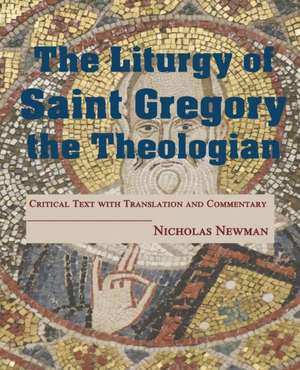The Liturgy of Saint Gregory the Theologian
Autor Nicholas Newmanen Limba Engleză Paperback – 25 feb 2019
In addition to the edition, this book offers a translation of the text, as well as a commentary. The commentary looks at literary elements, such as intertextuality, philosophical and theological elements and the programmatic use of language. The commentary also attempts to clear up some of the fundamental questions about this text. While many of these questions have been discussed before in the secondary literature dealing with this liturgy, or liturgies generally, often the discussion was limited only in a context that dealt with a partial picture of the text.
One of these fundamental questions, among many, concerns the placement of the text in time. The Greek manuscripts are clustered relatively late, in the fourteenth century. Despite this, the liturgy does not seem to be a composition of the Middle Ages, the Coptic versions of the text, for example, date from much earlier, the sixth century or so. Is the Greek text, then, a translation of a Coptic original? A few pieces of internal evidence suggest otherwise, that instead, the late manuscripts of the Greek text are the only extant manuscripts in a much longer tradition. By looking at one of the unique features of the text, the pervasive direct address of Christ, the commentary teases out the origin of the text as an anti-Arian polemical work of the theologically turbulent fourth century.
Another important question that is discussed in the commentary is the question of geographic provenance, where was this liturgy first written. As with the discussion of the dating of the text, this is initially a difficult question. The Greek and Coptic versions of the text are not in use outside of Egypt, and there are other liturgical texts attributed to St. Gregory the Theologian in other liturgical families, a Syrian Anaphora as well as an Armenian liturgy, this seems to suggest that this text belongs to the Alexandrinian family of liturgies. There are a few prayers, however, which the Egyptian Liturgy of St. Gregory has in common with the Byzantine Liturgy of St. Basil. This would not be unusual, as the Byzantine liturgies exerted a great deal of influence on the other eastern liturgical families, the shared prayers, however, address Christ, implying that they were not borrowed from the Liturgy of St. Basil by the Liturgy of St. Gregory, but the other way around. This implies, then, that the liturgy is not originally from Egypt, but from Cappadocia, or the environs around Constantinople.
| Toate formatele și edițiile | Preț | Express |
|---|---|---|
| Paperback (1) | 135.40 lei 6-8 săpt. | |
| Saint Dominic's Media Inc. – 25 feb 2019 | 135.40 lei 6-8 săpt. | |
| Hardback (1) | 243.50 lei 3-5 săpt. | +48.07 lei 4-10 zile |
| Saint Dominic's Media Inc. – 13 mar 2019 | 243.50 lei 3-5 săpt. | +48.07 lei 4-10 zile |
Preț: 135.40 lei
Nou
Puncte Express: 203
Preț estimativ în valută:
25.92€ • 28.16$ • 21.78£
25.92€ • 28.16$ • 21.78£
Carte tipărită la comandă
Livrare economică 22 aprilie-06 mai
Preluare comenzi: 021 569.72.76
Specificații
ISBN-13: 9781732178465
ISBN-10: 1732178461
Pagini: 372
Dimensiuni: 191 x 235 x 21 mm
Greutate: 0.69 kg
Editura: Saint Dominic's Media Inc.
ISBN-10: 1732178461
Pagini: 372
Dimensiuni: 191 x 235 x 21 mm
Greutate: 0.69 kg
Editura: Saint Dominic's Media Inc.
Notă biografică
After completing his undergraduate work in Ancient Greek and Classics at the University of New Hampshire, Nicholas Newman did his graduate work in Ancient Greek, Latin and Medieval History at the University of Zurich, Switzerland, completing his dissertation in 2014. Since finishing his doctoral work, he has been teaching Latin, Greek and Humanities at Kearsarge Regional High School and Northeast Catholic College in New Hampshire.
